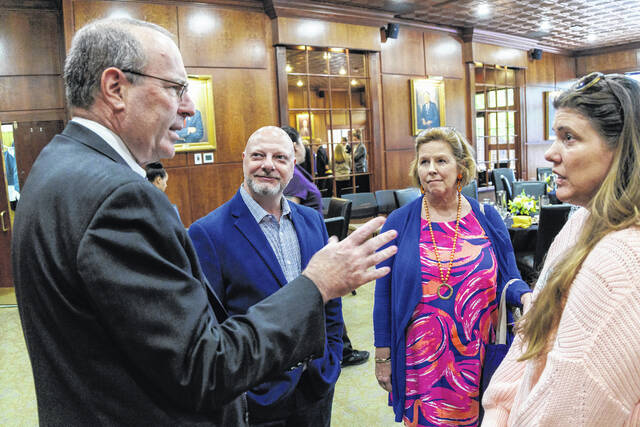
Federal Reserve Bank of Richmond President Tom Barkin engages with Lumberton Rotary Club members during UNCP visit.
Courtesy photo | UNCP
PEMBROKE — In a rare visit to Robeson County, the head of the Federal Reserve Bank of Richmond met with local business owners and community leaders to gain firsthand insight into the economic challenges facing rural America. The visit offered a “boots-on-the-ground” look at the day-to-day realities shaping small-town economies, from workforce shortages to rising costs.
During his stop at The University of North Carolina at Pembroke, Tom Barkin discussed inflation, workforce development and access to capital, emphasizing the importance of understanding local perspectives to inform monetary policy.
Barkin met with Chancellor Robin Gary Cummings and his leadership team during a roundtable discussion with business and community leaders, bankers and public officials. Earlier in the day, Barkin visited the Lumbee Tribe’s headquarters and met with tribal leaders.
“We were honored to welcome President Barkin and Dr. (Matt) Martin to UNC Pembroke,” Cummings said. “Their visit provided a valuable opportunity to demonstrate the university’s vital role as an anchor institution in southeastern North Carolina.
“From the impact of NC Promise on access and enrollment, to our efforts in strengthening the local health care workforce and economy, our discussions reflected the full scope of UNCP’s commitment to regional progress,” Dr. Cummings said.
“We explored the challenges and opportunities in recruiting and retaining talent, the influence of state and federal policy and our ongoing collaboration with town and county partners to drive economic growth. We were especially pleased to invite community leaders, including members of the Lumberton Rotary, for an opportunity to engage and hear from President Barkin.”
Kyle Chavis, CEO of Lumbee Guaranty Bank, said he appreciated Barkin’s visit, noting the importance of having the Federal Reserve Bank president hear directly from rural communities.
“It is invaluable to have someone of his stature and his position to spend time in our community, hearing from businesspeople, bankers and educators about what is going on in our community,” Chavis said. “He uses that information to go back to the Fed and craft policy, which, in turn, comes back and affects us. I appreciate that he gets out across his district and into the rural communities.”
Barkin frequently participates in listening tours across the Fifth District, which includes North Carolina, South Carolina and Virginia. Since assuming his role in 2018, he has prioritized engaging directly with communities throughout the district. During a luncheon hosted by the Lumberton Rotary Club, Barkin touched on various topics, including how tariff price hikes, proposed cuts in government spending and energy prices may impact the economy.
“We do learn a lot from being on the ground. There is so much happening in the world today,” said Barkin, who was accompanied by Matt Martin, a regional executive based out of the Charlotte branch and Jim Strader, media relations specialist.
“The opportunity to talk to businesses and consumers and see how the economy has affected them, that’s the key insight we need to bring back to Washington,” Barkin said.
UNCP Trustee Jim Hyler, a close friend of the Fed Reserve president, said Barkin is interested in the economic well-being of everyone, not just people in the more affluent metropolitan areas.
“He is keenly interested in rural North Carolina, and he wants those areas to be successful,” Hyler said. “He understands the significance of UNC Pembroke and what this university means to Robeson County and southeastern North Carolina. He is interested in ways that he, as president of the Richmond Fed, can help and support our mission.”
Lumberton businessman Bo Biggs said the opportunity to host the head of the Richmond Bank shows thoughtful leadership, “especially in recognizing the struggles of rural, low-income communities and his concern for Tier 1 counties where families are working to stretch every paycheck.”
“You can see the Federal Reserve (Bank) is concerned about the economies of counties like ours in contrast with urban counties like Wake and Mecklenburg,” Biggs said. “It is very heartwarming to see people who we might often view as distant or in the white ivory towers on the ground in these communities fighting for economic viability.”
